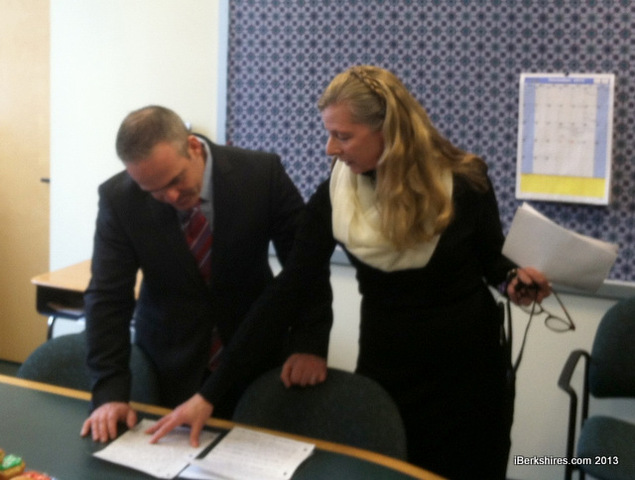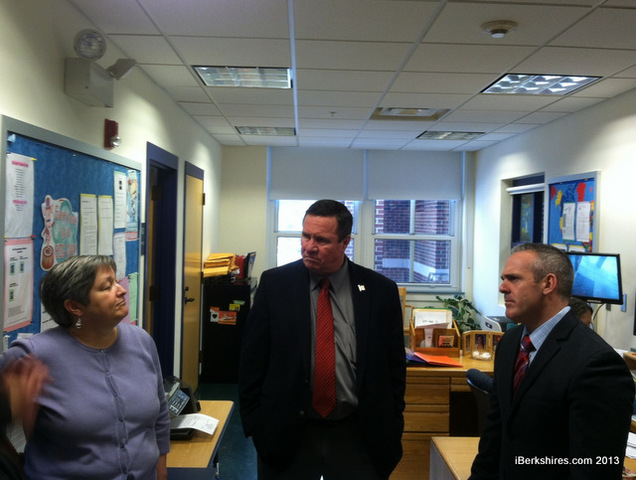

Education Secretary Malone Shares Insight on New Testing
 State Secretary of Education Matthew Malone meets pupils during his visit to Becket-Washington Elementary School on Friday. State Secretary of Education Matthew Malone meets pupils during his visit to Becket-Washington Elementary School on Friday. |
BECKET, Mass. — State Secretary of Education Matthew Malone's trip to the Berkshires included a tour of Becket-Washington Elementary School and encouraging words for its students and school officials on Friday.
Malone met with administrators, School Committee members and the superintendent to informally discuss important education issues in the region and state. Superintendent William Cameron welcomed Malone, along with Principal Leslie Blake-Davis and members of the School Committee.
Concerns Assistant Superintendent Robert Putnam had with the efforts of regional school officials to implement rigorous District Determined Measures — part of a state initiative meant to reflect the connection between strong professional practices and student achievement — were immediately quelled by Malone.
"People are getting all worried about the accountability police coming out. I don't see 'em," Malone said. "From what you just described to me, you already sound 10 times more prepared than most other places we've talked to."
Following an educators' meeting he attended this week at Frontier High School at which an urgency for implementing state assessment measurements were a topic of concern, Putnam said Malone's message, "don't freak out," was welcomed, given his influence in state education policy.
Malone's interest in visiting the elementary school was expressed to Blake-Davis at a recent state conference, particularly because it is one of 47 innovation schools created in 2010, a distinction that allows for greater flexibility with regards to curriculum, policy, professional development and other administrative areas.
Blake-Davis made it a point to introduce Grade 5 teacher Shannon Griffin, whose students ranked No. 1 in the state in math scores. Throughout conversations with third- and fourth-grade students engaged in writing and reading exercises, Malone said he was impressed by the practice of core competency skills in each classroom.
Blake-Davis referenced the integration initiative her students participate in, partnering with Becket-Chimney Corners YMCA and Vermont-based non-profit Four Winds Nature Institute. The program that places students on site at Four Winds five days out of the year for "place-based environmental science education" she described as, "sort of exploring the next generation."
 |
To that, Malone said, "You're already in it," telling school officials that the type of non-fiction reading and writing the program provides is crucial to Common Core competency and should be focused on defending points with contextual evidence.
"It's really powerful stuff. That's how we're going to get at 21st-century skills. That's one of the things that we lacked for so long," Malone said.
Innovation schools was made a line item in the fiscal 2014 budget, creating the potential for additional funding for schools such as Becket-Washington.
According to Malone, there is some misunderstanding of core competency strategies largely because of common misconceptions about impending implementation of PARCC trial tests throughout the commonwealth.
"The state has not voted to abandon the MCAS yet. What we voted on, was to field test the PARCC," Malone said.
Massachusetts is part of a consortium of states and agencies testing the Partnership for Assessment of Readiness for College and Careers as part of its adoption of Common Core standards. C.T. Plunkett Elementary School in Adams will be among the first in the state to pilot the tests.
The tests were meant to be administered online, though statewide issues with infrastructure — the availability of broadband Internet connectivity — has led to an inequity in information access that must be remedied for the PARCC tests to fulfill their intended cause, according to Malone.
Tags: assessment, elementary schools, MCAS, PARCC, testing,















